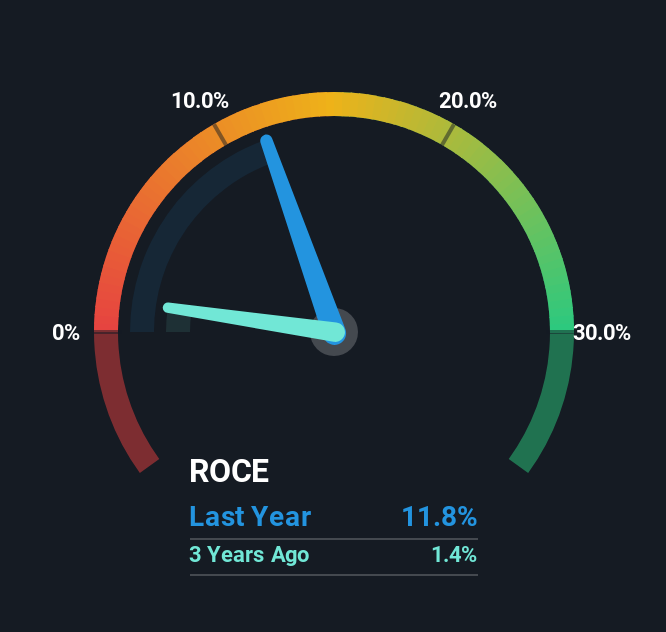If we want to find a potential multi-bagger, often there are underlying trends that can provide clues. Ideally, a business will show two trends; firstly a growing return on capital employed (ROCE) and secondly, an increasing amount of capital employed. Ultimately, this demonstrates that it's a business that is reinvesting profits at increasing rates of return. So on that note, Savor (NZSE:SVR) looks quite promising in regards to its trends of return on capital.
Understanding Return On Capital Employed (ROCE)
For those who don't know, ROCE is a measure of a company's yearly pre-tax profit (its return), relative to the capital employed in the business. To calculate this metric for Savor, this is the formula:
Return on Capital Employed = Earnings Before Interest and Tax (EBIT) ÷ (Total Assets - Current Liabilities)
0.12 = NZ$4.8m ÷ (NZ$52m - NZ$11m) (Based on the trailing twelve months to March 2025).
So, Savor has an ROCE of 12%. In absolute terms, that's a satisfactory return, but compared to the Hospitality industry average of 7.9% it's much better.
See our latest analysis for Savor

Historical performance is a great place to start when researching a stock so above you can see the gauge for Savor's ROCE against it's prior returns. If you'd like to look at how Savor has performed in the past in other metrics, you can view this free graph of Savor's past earnings, revenue and cash flow.
What Can We Tell From Savor's ROCE Trend?
We like the trends that we're seeing from Savor. Over the last five years, returns on capital employed have risen substantially to 12%. The amount of capital employed has increased too, by 40%. The increasing returns on a growing amount of capital is common amongst multi-baggers and that's why we're impressed.
In Conclusion...
In summary, it's great to see that Savor can compound returns by consistently reinvesting capital at increasing rates of return, because these are some of the key ingredients of those highly sought after multi-baggers. Astute investors may have an opportunity here because the stock has declined 62% in the last five years. That being the case, research into the company's current valuation metrics and future prospects seems fitting.
If you want to continue researching Savor, you might be interested to know about the 2 warning signs that our analysis has discovered.
While Savor isn't earning the highest return, check out this free list of companies that are earning high returns on equity with solid balance sheets.
New: Manage All Your Stock Portfolios in One Place
We've created the ultimate portfolio companion for stock investors, and it's free.
• Connect an unlimited number of Portfolios and see your total in one currency
• Be alerted to new Warning Signs or Risks via email or mobile
• Track the Fair Value of your stocks
Have feedback on this article? Concerned about the content? Get in touch with us directly. Alternatively, email editorial-team (at) simplywallst.com.
This article by Simply Wall St is general in nature. We provide commentary based on historical data and analyst forecasts only using an unbiased methodology and our articles are not intended to be financial advice. It does not constitute a recommendation to buy or sell any stock, and does not take account of your objectives, or your financial situation. We aim to bring you long-term focused analysis driven by fundamental data. Note that our analysis may not factor in the latest price-sensitive company announcements or qualitative material. Simply Wall St has no position in any stocks mentioned.
About NZSE:SVR
Good value with mediocre balance sheet.
Market Insights
Community Narratives




